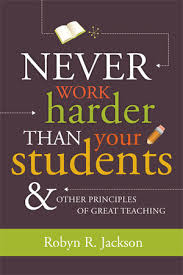After completing each school year, invariably, I examine my curriculum, formative assessments and standardized test results to determine what I need to change to make the subsequent year even more successful for students. While engaged in the reflective process post the 2012-2013 academic year, I came across the book Never Work Harder than Your Students by Robyn Jackson, a rising star in the curriculum and instruction field.
Upon initial inspection of the title, it might illusively appear to be a step-by-step guide for being a lazy teacher; however, it’s quite the opposite. In this page-turner, Jackson shares effective strategies for becoming a master teacher.
According to Jackson, master teachers exhibit 7 principles:
- They start where their students are.
- They know where their students are going.
- They expect to get their students to their goals.
- They support their students along the way.
- They use feedback to help them and their students get better.
- They focus on quality rather than quantity.
- They never work harder than their students.
She designed a Mastery Self-Assessment which is a multiple-choice survey addressing teachers’ approaches and beliefs about instruction, assessment, and curriculum. Each question is linked to a mastery principle; as a result, completion of the survey can be used to diagnose a teacher’s weakest and strongest areas along the continuum of being a mastery teacher.
I started off by completing the Mastery Self-Assessment to determine my performance along the continuum from novice to mastery teacher. Based on the results, I decided to change my approach on how I would support my weaker performing students in the 2013-2014 academic year. In the past, I would offer lunch and after-school tutorials to students who were not successful on formative and summative assessments. According to Jackson, this approach was reacting to students’ failure after the tasks were completed, instead of being “proactive about developing interventions before students fail.”
During 2013-2014, I instituted several proactive intervention strategies. First, I paired struggling students with academically successful students as daily study partners in the cafeteria. Second, since I was on cafeteria duty during that time, periodically, I would play review games with the struggling students to making the learning fun. They were always excited to share with me what they had reviewed with the tutors from their interactive science notebooks. Third, I availed myself for homework help in the cafeteria and after school so that students would have support on challenging homework assignments. I gave extended time to students who needed it on long assignments and assisted them in creating a manageable schedule to successfully complete these assignments. Fourth, all complex projects were completed in class so students had the support of school resources (i.e. teacher, computer, manipulatives, etc) and their peers. Fifth, cooperative groups were always dynamic and were revised based on students’ readiness level and interests based on the given task.
Collectively, these proactive intervention strategies were proven to very effective for my struggling students. On the June 2014 Regents Living Environment, 98% of my struggling students received scores from 71%-93%. 100% of my academically successful students had scores ranging from 88%-97%.

